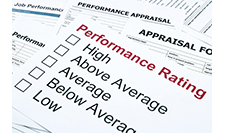 Most companies have annual reviews with employees to help track progress and evaluate their performance. But, it can feel overwhelming to look back and remember all your accomplishments and struggles. After all, a lot can happen in 12 months. Right now, mid-way through the year, is the perfect time to do a little prep work for your future annual review.
Most companies have annual reviews with employees to help track progress and evaluate their performance. But, it can feel overwhelming to look back and remember all your accomplishments and struggles. After all, a lot can happen in 12 months. Right now, mid-way through the year, is the perfect time to do a little prep work for your future annual review.
Read Previous Reviews
The first place to start is with your previous review. Scanning any notes you took or documents your supervisor provided at your last annual review will help you recall specific goals or expectations that you set for the year. It may also help to review several of your past reviews so you have a good picture of your long-term growth.
Start Your List
Compile a complete list of your recent accomplishments and completed projects. Include information to help measure the success of your work. Also, jot down any accolades or training you’ve received so far. All of this will help you and your supervisor have an accurate picture of your performance this year.
Meet With Your Manager
If you don’t already meet regularly, explain to your supervisor that you’re doing a mid-year check-up and would like to meet with them within the next few weeks. During the meeting, ask for their feedback on your performance and accomplishments over the last six months. To avoid waiting until it’s too late, also ask if you need to change anything moving forward in the second half of the year to meet your annual goals.
Make a Plan
Once you have a good idea of what you’ve done and what you need to change, make a plan for the next six months. Write out any specific actions that you or your manager noted you need to take. If there are still training or performance goals that you haven’t met yet, outline how you’re going to accomplish them before your annual review.
Just because your employer doesn’t require or instigate a mid-year review doesn’t mean you should skip it. Spending a little time and effort this summer could make all the difference in how your review turns out at year’s-end. Plus, it can turn a dreaded experience into a positive one.
Does your employer conduct a mid-year review, or do you do one on your own? Have you found it to be helpful? Let us know what you think in the comments section.
Movin’ On Up is brought to you by Express Employment Professionals.





